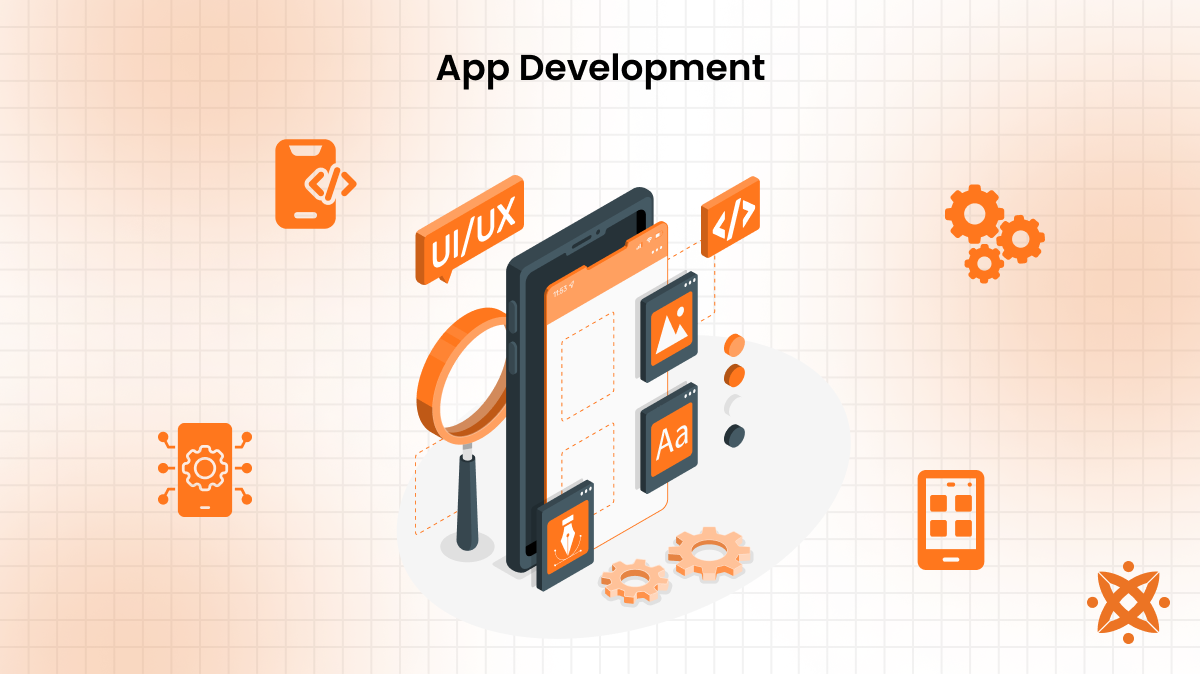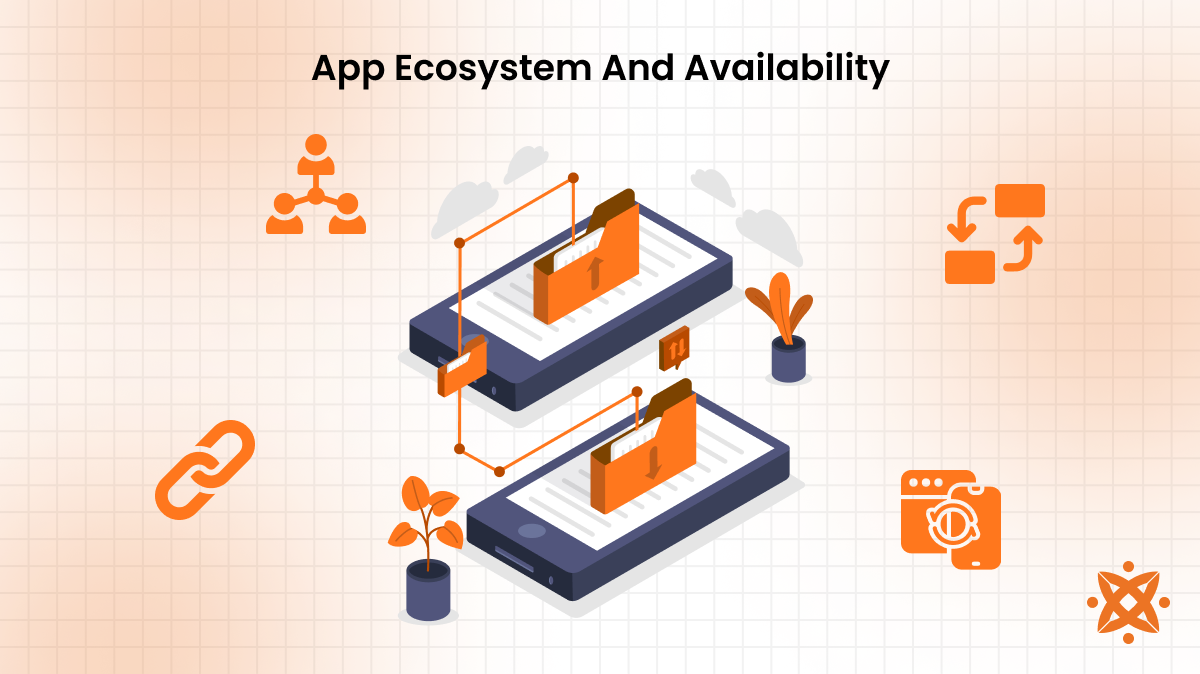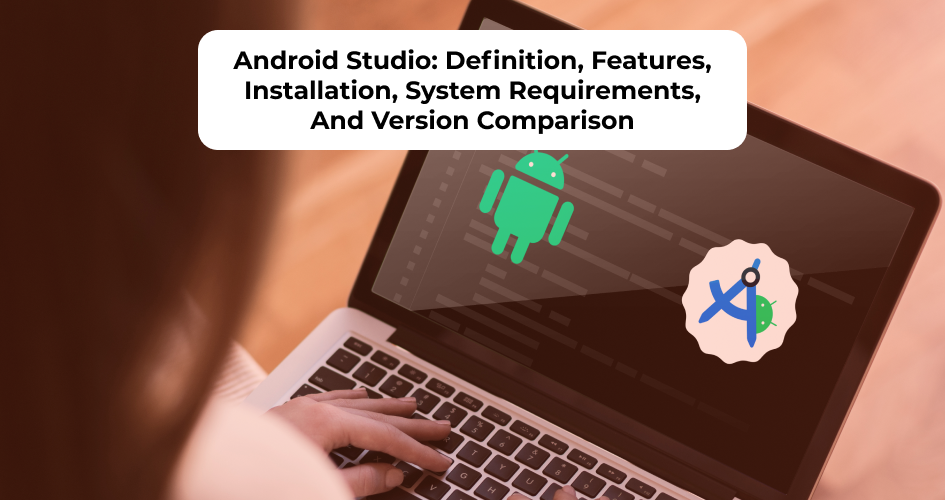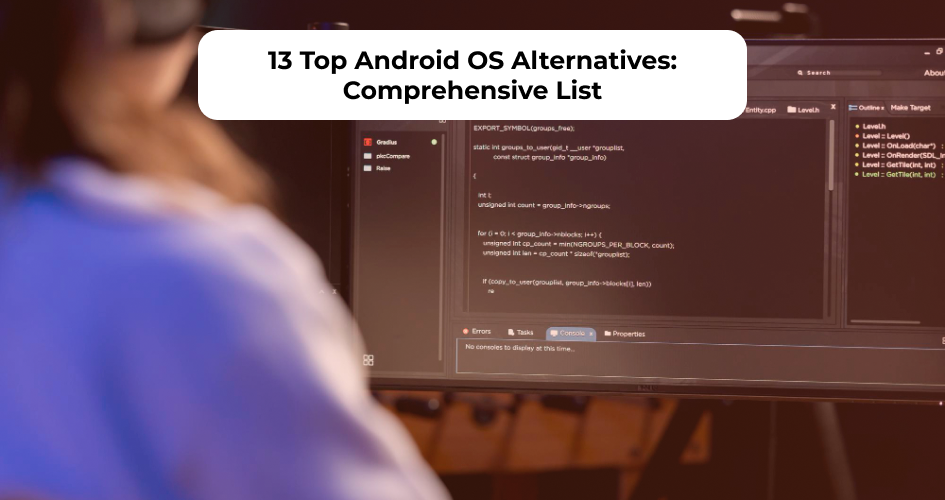The primary differences between Android and iOS are that Android allows users to personalize their devices with widgets, themes, and alternative app stores. In contrast, iOS emphasizes simplicity and integration within the Apple ecosystem.
The two operating systems share the main similarity that they prioritize user experience by delivering robust app ecosystems, regular updates, and advanced security features. They support a wide range of applications that cater to various needs.
Determining which operating system is better depends on individual preferences and requirements. Android offers device variety and affordability, making smartphones accessible to a broader audience. iOS, on the other hand, creates a cohesive and user-friendly ecosystem. Apple’s timely and consistent software updates ensure users have access to the latest features and security.
App Development
App development is the process of creating software applications for mobile devices, and there are distinct differences when comparing Android and iOS in this regard. One of the most significant differences is the development languages and frameworks used. For Android, developers typically use Java or Kotlin, with Android Studio as the main integrated development environment (IDE).
For iOS, Swift and Objective-C are the primary programming languages, with Xcode serving as the IDE. While both platforms have their dedicated languages, Swift for iOS is considered more modern and faster than Java. When it comes to cross-platform development, Android offers more flexibility with frameworks like Flutter, React Native, and Xamarin. Hence, it allows developers to write code once and deploy it across both Android and iOS platforms.
This can save time and resources, but often comes at the cost of reduced performance or design limitations. On the other hand, iOS has fewer cross-platform development options that maintain the same level of integration with Apple’s ecosystem.
Android is widely regarded as more open-source, allowing developers to modify the operating system and application code freely. This flexibility encourages more experimentation, customization, and innovation within the Android ecosystem.
In contrast, iOS is more closed, with Apple imposing strict guidelines and controls over the development environment. While this can limit certain freedoms, it results in a more stable and consistent experience for end-users, which many developers prefer when working within Apple’s tightly controlled environment.
Overall, both Android and iOS offer powerful platforms for app development, each with its strengths and trade-offs. Android is favored for flexibility, wide support for cross-platform development, and open-source options. At the same time, iOS is preferred for its polished environment, seamless integration with hardware, and higher app quality control.
App Ecosystem And Availability
The app ecosystem refers to the distribution, accessibility, and regulation of mobile applications within a specific operating system. For Android, this ecosystem is primarily built around the Google Play Store, while for iOS, it is centered on the Apple App Store. The Google Play Store supports a broader submission policy, allowing a larger volume of applications, including utilities, tools, and emulators that are not permitted on iOS.
In contrast, the App Store applies more rigorous review processes, resulting in fewer apps but often with higher quality and security standards. One key difference lies in app restrictions. Apple enforces stricter guidelines on privacy, monetization methods, and app functionalities, which limit certain types of apps from being published.
While apps with extensive background activity, system-level modifications, or dynamic code execution are often rejected in iOS, Android permits more flexibility in this regard. Developers can distribute apps outside of the Play Store via APKs and third-party platforms, contributing to a more open but less controlled environment.
Exclusive apps are another distinguishing factor. Some apps launch first or remain exclusive to iOS due to Apple’s monetization structure, user spending habits, or partnerships. iOS users often gain earlier access to new applications and updates. Conversely, Android exclusives typically stem from regional developers or hardware-specific alliances, particularly in markets like Asia and Latin America.
Software Updates And Longevity
Software updates and device longevity differ significantly between Android and iOS. Apple maintains full control over its hardware and software ecosystem, allowing it to deliver iOS updates simultaneously across all supported devices. iPhones typically receive system updates for 5 to 6 years, with security patches extending beyond that.
In contrast, Android suffers from fragmentation due to its open-source nature and the involvement of multiple manufacturers. Update schedules vary widely by brand, model, and region, with most Android devices receiving major updates for only 2 to 3 years.
According to data from StatCounter titled “Android Version Market Share Worldwide” and “iOS Version Market Share Worldwide,” published in March 2025, only 34.59% of Android devices were running the latest Android 14 version, while iOS 18.3 had an adoption rate of 58.58% among eligible iPhones. This reflects Android’s ongoing fragmentation compared to iOS’s unified update distribution.
Despite shorter update cycles, Android offers a wider range of device choices with varying lifespans and hardware configurations, which appeals to a broader market. However, iOS maintains a clear advantage in update uniformity, long-term support, and security maintenance.
Market Share And Popularity
According to global usage data by StatCounter titled “Mobile Operating System Market Share Worldwide,” published in March 2025, Android holds 71.75% of the global market, while iOS accounts for 27.78%.
This disparity is particularly pronounced in regions like Africa and Asia. Android’s open-source nature and availability across a wide range of devices, including more affordable options, contribute to its widespread adoption. Conversely, in markets such as North America and parts of Europe, iOS enjoys a more substantial user base, attributed to Apple’s strong brand loyalty and premium product positioning.
UI/UX Design
UI/UX design refers to the visual presentation (User Interface) and the overall user experience (User Experience) when interacting with a mobile operating system. Android offers greater personalization options, including adjustable home screen layouts, third-party launcher support, and system-wide themes.
Android widgets are more functional and flexible, allowing users to resize, move, and interact with them directly on the home screen. iOS maintains a more uniform and controlled design approach, focusing on simplicity and consistency. Widgets were introduced to iOS later and remain limited in customization compared to Android.
Themes on iOS are restricted to wallpaper changes and light/dark mode toggling, while Android supports complete UI overhauls through third-party apps and manufacturer-specific interfaces. Both systems prioritize user experience, but Android emphasizes flexibility, while iOS focuses on cohesion and ease of use.
Security And Privacy
Android and iOS differ in their approach to security and privacy features. iOS operates under a closed ecosystem, granting Apple full control over hardware and software integration. This structure enables consistent implementation of security updates, sandboxing, and biometric authentication.
App permissions in iOS are restrictive by default, with mandatory prompts for access to sensitive data such as location, contacts, and camera. Additionally, iOS uses on-device processing for features like facial recognition and introduces app tracking transparency to limit cross-app data collection.
Android, by contrast, is open-source and implemented across numerous manufacturers, creating inconsistencies in the rollout of security patches. While Android 14 includes secure boot, biometric authentication, and scoped storage, enforcement varies by device and manufacturer.
Android also allows broader app sideloading, which increases exposure to malicious software if not properly managed. However, recent versions have improved permission controls, allowing one-time access and background activity restrictions.
Both systems integrate encryption, biometric security, and permission control frameworks. Still, iOS leads in centralized enforcement and data isolation, while Android provides greater flexibility at the cost of uniform security application.
Performance And Hardware Optimization
Performance and hardware optimization vary due to the foundational differences in how Android and iOS are developed and deployed. iOS is designed specifically for Apple hardware, enabling tight software-hardware integration. This results in efficient resource management, faster app load times, and sustained battery performance across models.
Apple’s custom silicon, such as the A17 Pro chip in the iPhone 15 Pro, consistently outperforms flagship Android chipsets in benchmark tests for single-core speed and power efficiency. Android, used across a range of manufacturers, faces variability in performance due to differences in hardware quality and software implementation.
Devices powered by high-end chips like the Snapdragon 8 Gen 3 offer competitive performance but can experience slower updates and less consistent optimization. Battery life on Android is more device-dependent, with some models providing larger batteries or aggressive power-saving modes to compensate for software inefficiencies.
While both platforms deliver strong performance at the flagship level, iOS maintains an advantage in sustained speed and battery optimization due to its vertically integrated design. Android excels in offering a wide variety of hardware options, balancing performance and battery life differently across segments.
Pricing And Device Variety
Android offers a broader range of pricing options compared to iOS, covering entry-level, mid-range, and flagship segments. Devices under Android can be found starting below $150, making the platform accessible across global markets. Manufacturers like Xiaomi, Realme, and Samsung produce affordable models that retain essential smartphone functionalities.
On the other end, Android flagships like the Galaxy S24 Ultra or Pixel 8 Pro are priced similarly to iPhones, but still reflect more variety in feature-to-cost ratios. iPhones are positioned strictly in the premium and upper mid-range categories, with the lowest-cost model, the iPhone SE (3rd Gen), priced above $400. Apple maintains a limited device lineup, focusing on high-performance hardware and extended support cycles.
In terms of variety, Android dominates, with multiple manufacturers producing hundreds of models yearly. iOS, while limited to Apple’s own devices, offers fewer choices but consistent performance across its product range. Affordability and market segmentation remain Android’s defining advantages, while iOS targets uniformity within the high-end smartphone segment.
History
Android and iOS emerged in the late 2000s as the dominant mobile operating systems. Google launched Android in 2008, following its 2005 acquisition of Android Inc. It was developed as an open-source platform. The first commercial Android phone, the HTC Dream (T-Mobile G1), introduced features such as notification panels and home screen widgets, which are core to the Android experience.
iOS, originally named iPhone OS, was launched in 2007 alongside the first-generation iPhone. Developed exclusively by Apple, it introduced a capacitive touchscreen interface without physical keyboards, setting a new standard for smartphones.
While Android has grown through diversification and global manufacturer adoption, iOS has evolved through centralized innovation and ecosystem control. Both systems have influenced each other over time, gradually adopting features pioneered by the other. This results in increasingly overlapping user experiences despite their differing developmental philosophies.
Customization
Android provides extensive customization capabilities across its interface and functionality. Users can modify home screens and install custom launchers. Advanced users can access developer settings, enable root access, or install custom ROMs to alter system-level behaviors. Custom android app development caters to a broad user base seeking personalized experiences from.
iOS restricts system-level customization to maintain consistency and security across devices. Since iOS 14, customization has been limited to changing wallpapers, arranging app icons within fixed grids, selecting light or dark themes, and using widgets in predefined spaces.
Both platforms support accessibility features and minor visual adjustments. Still, Android remains the leading operating system for users prioritizing personalization, while iOS emphasizes stability through a controlled and uniform user interface.
Is iOS Better Than Android OS?
No, iOS is not better than Android OS because of limited device variety, restricted customization, and slower innovation in certain features. Android supports a broader hardware range, from entry-level phones to premium flagships, allowing users more choices across budgets and specifications. Android also enables deeper customization, giving users control over system appearance, behavior, and third-party app flexibility.
Additionally, Android manufacturers often introduce hardware features, such as high refresh rate displays, periscope zoom cameras, and foldable designs, before they appear on iOS. While iOS offers consistency and long-term support, Android delivers greater adaptability and broader market accessibility.
What Is iOS?
iOS is the core operating system for Apple’s mobile devices. It provides a stable, closed ecosystem where software is optimized specifically for Apple hardware. This approach ensures a uniform experience across all supported iPhones and iPads, featuring a seamless integration of hardware, software, and services like iCloud and the App Store.
iOS is recognized for its polished user interface, regular updates, and strict security measures, creating a platform that prioritizes performance and reliability.
What Is Android OS?
Android OS is the mobile operating system designed to power devices from a wide range of manufacturers. Built on an open-source framework, it enables diverse hardware configurations and user experiences. The flexibility of Android OS allows Android to run on millions of smartphones, tablets, and other smart devices.
The system is continually updated with features and security enhancements, ensuring it remains versatile and scalable across various market segments.
What Is The Difference Between macOS and iOS?
The main difference between macOS and iOS is their primary use cases; macOS is designed for desktop and laptop computers, while iOS is optimized for touchscreen mobile devices. macOS supports a more open file system, advanced multitasking, and a wider range of productivity software, making it ideal for professional workloads.
In contrast, iOS emphasizes portability, app store distribution, and battery efficiency, ensuring smooth performance on smaller screens and lighter hardware. Secondary differences include their user interfaces. MacOS relies on mouse and keyboard inputs, and iOS utilizes gestures and touch commands. They also have distinct update cycles and hardware compatibility.
What Is The Difference Between Samsung And Android OS?
The main difference between Samsung and Android OS is that Samsung is a hardware manufacturer, while Android OS is the software platform that powers many of Samsung’s devices.
Multiple manufacturers, including Samsung, use Android to run apps, manage hardware, and deliver updates. Samsung, on the other hand, produces physical devices like smartphones, tablets, and wearables and often customizes the Android OS with its user interface (One UI) and additional features.
Secondary differences include the integration of Samsung-exclusive applications, such as Samsung Pay and Samsung Health, and the fact that Android updates often depend on Samsung’s schedule rather than Google’s, creating slight delays in how quickly users receive the latest software.
What Is The Difference Between iOS, Android OS, And Harmony?
The main difference between iOS, Android OS, and Harmony OS is that iOS is a closed, proprietary operating system for Apple’s hardware. Android OS is open-source and used by various manufacturers, offering more customization and device diversity.Harmony OS, created by Huawei, focuses on seamless integration across multiple device types.
Secondary differences include app availability and developer support. iOS has a curated app ecosystem with strict guidelines, ensuring quality and security. Android’s open nature allows for a more extensive selection of apps, including those from third-party sources. Harmony OS is still growing its app library, relying on Huawei’s AppGallery rather than Google Play or the Apple App Store.
Additionally, Harmony OS emphasizes cross-device interaction, while iOS and Android prioritize their respective ecosystems, Apple’s with Macs and iPads, and Android’s with the Google ecosystem and various manufacturers.
What Is The Market Share Of Android vs. iOS Globally And In Regions Like Europe Or The US?
As of early 2025, Android maintains a significant lead in the global mobile operating system market, holding approximately 72.15% of the share, while iOS accounts for about 27.37%. In Europe, the distribution is similar, with Android at 65.5% and iOS at 34.04%. However, in the United States, iOS surpasses Android, capturing a 57.68% market share compared to Android’s 42.06%.







